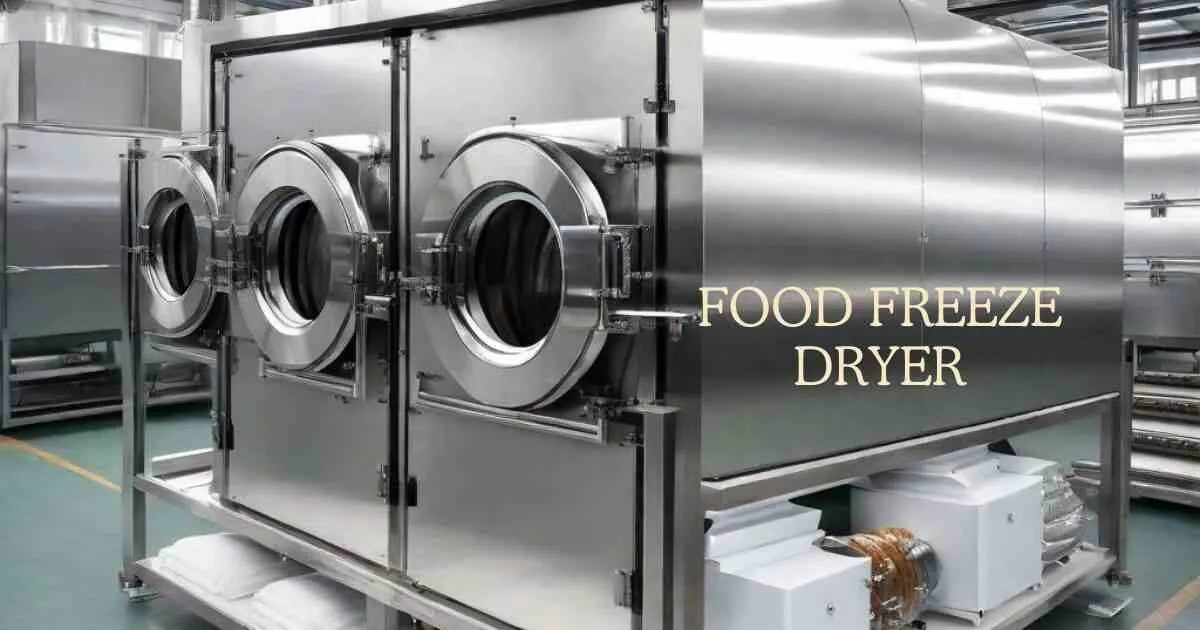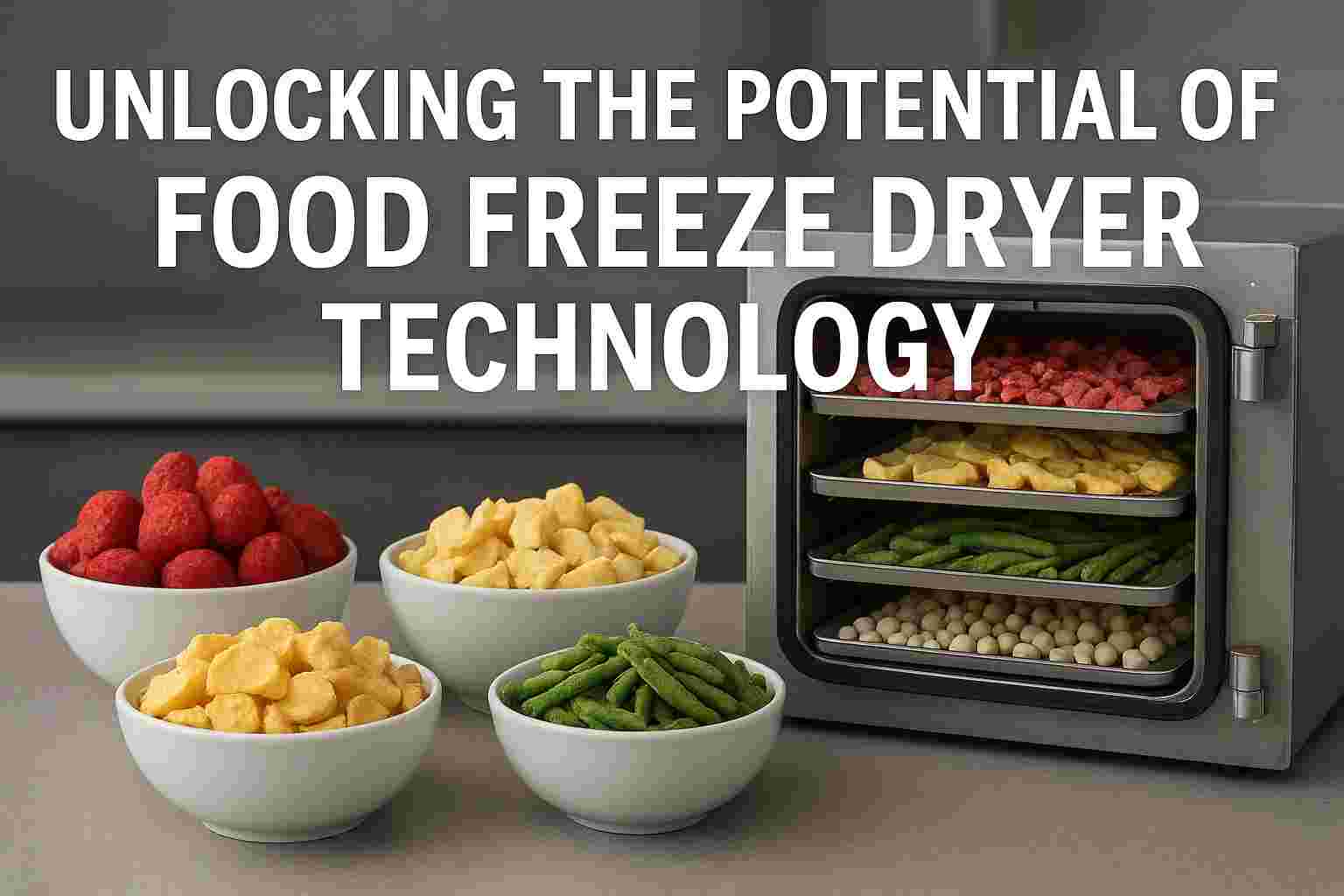Food freeze dryer technology, also known as lyophilization, is transforming the way we preserve food by extending shelf life without compromising taste, nutrition, or texture. Unlike traditional drying methods, which often degrade flavor and essential nutrients, freeze dryers use a unique process that locks in freshness while preventing spoilage. This makes them a reliable solution for both households and industries aiming to reduce food waste and enhance long-term storage.
The process of freeze-drying involves freezing food, reducing pressure, and gently removing moisture through sublimation. This advanced technique ensures that the structural integrity of food remains intact, offering consumers a product that looks, tastes, and feels remarkably similar to its fresh counterpart. From fruits and vegetables to meats, dairy, and even candies, freeze dryer technology is adaptable across a wide variety of applications.
As demand for healthier, shelf-stable, and convenient food options continues to grow worldwide, the role of food freeze dryers has become increasingly important. They are not only widely used in the food industry but also play a crucial role in pharmaceuticals and biotechnology. With innovations focusing on efficiency, energy savings, and compact home models, freeze dryer technology is poised to become a mainstream preservation method shaping the future of food and healthcare.

Table of Contents
ToggleUnderstanding the Process of Freeze-Drying
Freeze-drying involves three main steps: freezing, primary drying, and secondary drying. Firstly, the food is frozen at low temperatures to solidify the water content. Then, the pressure is reduced, and heat is applied to sublimate the frozen water directly into vapor. Finally, the remaining moisture is removed under vacuum conditions, leaving behind a dehydrated product.
Benefits of Freeze-Drying Food
Preservation of Nutritional Value: Freeze-drying preserves the nutritional integrity of food by minimizing the loss of vitamins, minerals, and antioxidants during the drying process. Unlike traditional drying methods, which can degrade sensitive nutrients, freeze-drying retains the original composition of the food.
Extended Shelf Life: One of the primary advantages of freeze-dried food is its extended shelf life. By removing moisture, the growth of microorganisms and enzymatic reactions that cause food spoilage are inhibited, resulting in products that can be stored for long periods without refrigeration.
Retention of Flavor and Texture: Freeze-drying maintains the natural flavor and texture of food, offering consumers a sensory experience similar to fresh ingredients. Unlike other preservation techniques that can alter taste and consistency, freeze-dried products rehydrate quickly and retain their original characteristics when reconstituted.
Applications of Freeze Dryer Technology
Freeze dryer technology finds diverse applications across several industries:
Food Industry
In the food industry, freeze-drying is used to produce a wide range of products, including fruits, vegetables, meats, and dairy items. Freeze-dried ingredients are popular in ready-to-eat meals, snacks, and emergency rations due to their lightweight, shelf-stable nature.
Pharmaceutical Industry
Pharmaceutical companies utilize freeze dryers to preserve sensitive drugs, vaccines, and biological materials. The stability provided by freeze-drying helps maintain the potency and efficacy of medications, particularly those prone to degradation in liquid form, to preserve a wide range of sensitive substances, including:
- Sensitive Drugs: Such as antibiotics, hormones, and biologics.
- Vaccines: To maintain their potency and efficacy during storage and transportation.
- Biological Materials: Including enzymes, proteins, and DNA samples.
- Enhanced Shelf Life: Extending the stability of drugs and vaccines, reducing wastage.
- Maintaining drug stability: preserving the chemical and physical properties of the product.
- Preservation of Biological Activity: Ensuring the efficacy of biologics and sensitive biological materials.
Biotechnology
Freeze-drying is essential in biotechnology for the preservation of enzymes, antibodies, and other biomolecules used in research and diagnostic applications. By lyophilizing these biological materials, scientists can prolong their shelf life and ensure consistent performance in experiments. the importance of freeze-drying in biotechnology.
- Freeze-drying preserves biological materials by removing moisture without damaging their structure.
- It ensures long-term stability and viability of sensitive biomolecules like proteins and enzymes.
- Biotechnology relies on freeze-drying for the storage and transportation of vaccines and diagnostic agents.
- Freeze-drying enables the production of shelf-stable biopharmaceuticals with extended expiration dates.
- This method facilitates the lyophilization of complex formulations such as liposomes and nanoparticles.
- Biotechnological research often requires freeze-drying for preserving cell cultures and genetic materials.
- Freeze-drying minimizes the risk of contamination and degradation during sample storage.
- It allows for the concentration and purification of biomolecules without denaturation.
- Biotech companies utilize freeze-drying in the development of novel therapies and drug delivery systems.
- The scalability and reproducibility of freeze-drying make it a cornerstone technology in biotechnological processes.
Factors to Consider When Choosing a Freeze Dryer
Several factors should be considered when selecting a freezer for specific applications:
Capacity: The capacity of the freeze dryer determines the volume of product that can be processed at once. It’s essential to choose a machine with sufficient capacity to meet production demands without sacrificing efficiency.
Efficiency: Efficiency metrics such as drying time, energy consumption, and yield should be evaluated to optimize operational costs and resource utilization.
Cost: The initial investment cost of a freeze dryer, as well as ongoing maintenance expenses, should be weighed against the benefits of improved product quality and extended shelf life.
Maintenance: Regular maintenance and servicing are crucial for ensuring the longevity and performance of a freezer. Consider the availability of spare parts and technical support when selecting a manufacturer.
Innovations in Freeze Dryer Technology
Advancements in freeze dryer technology continue to enhance efficiency, reliability, and user experience.
Advanced Control Systems: Modern freeze dryers feature sophisticated control systems that allow for precise monitoring and adjustment of process parameters such as temperature, pressure, and drying time.
Energy Efficiency: Efforts to improve energy efficiency in freeze-drying operations have led to the development of systems that minimize heat loss and optimize resource utilization, reducing operational costs and environmental impact.
Integration with IoT: Integration with the Internet of Things (IoT) enables remote monitoring and control of freeze-drying processes, providing real-time insights and alerts to operators for improved efficiency and productivity.
How to Use a Freeze Dryer
Preparation of Food: Before freeze-drying, food items should be cleaned, sliced, or chopped into uniform pieces to ensure even drying and consistent results.
Loading the Freezer Dryer: Arrange the prepared food on trays or shelves inside the freeze dryer, leaving space between items to allow for proper airflow and sublimation.
Operation and Monitoring: Start the freeze-drying cycle according to the manufacturer’s instructions, monitoring the process for any irregularities and adjusting settings as necessary.
Storage of Freeze-Dried Food: Once the drying cycle is complete, remove the freeze-dried food from the machine and package it in airtight containers or vacuum-sealed bags for long-term storage.
Future Trends in Freeze Dryer Technology
Miniaturization: Advances in miniaturization may lead to the development of compact, portable freeze dryers suitable for personal and home use, expanding accessibility to this preservation technology.
Personal and Home Use: The availability of smaller, more affordable freeze dryers could empower consumers to preserve seasonal produce, leftovers, and homemade recipes with minimal effort, reducing food waste and promoting sustainability.
Sustainable Practices: Continued research into sustainable materials and processes for freeze-drying could further reduce environmental impact and enhance the eco-friendliness of this preservation method.
Conclusion of Food Freeze Dryer Technology
Food freeze dryer technology offers a versatile solution for preserving food, pharmaceuticals, and biologics with minimal loss of quality or nutritional value. As innovations continue to drive efficiency and accessibility, the potential benefits of freeze-drying are expanding, revolutionizing the way we store and consume perishable goods.
FAQs
How long does freeze-dried food last? Freeze-dried food can last anywhere from several months to several years, depending on storage conditions and packaging methods.
Can you freeze-dry meat at home? Yes, it is possible to freeze-dry meat at home using a domestic freezer. However, proper preparation and storage are essential to ensure safety and quality.
Is freeze-dried food healthy? Freeze-dried food retains much of its original nutritional content, making it a convenient and healthy option
